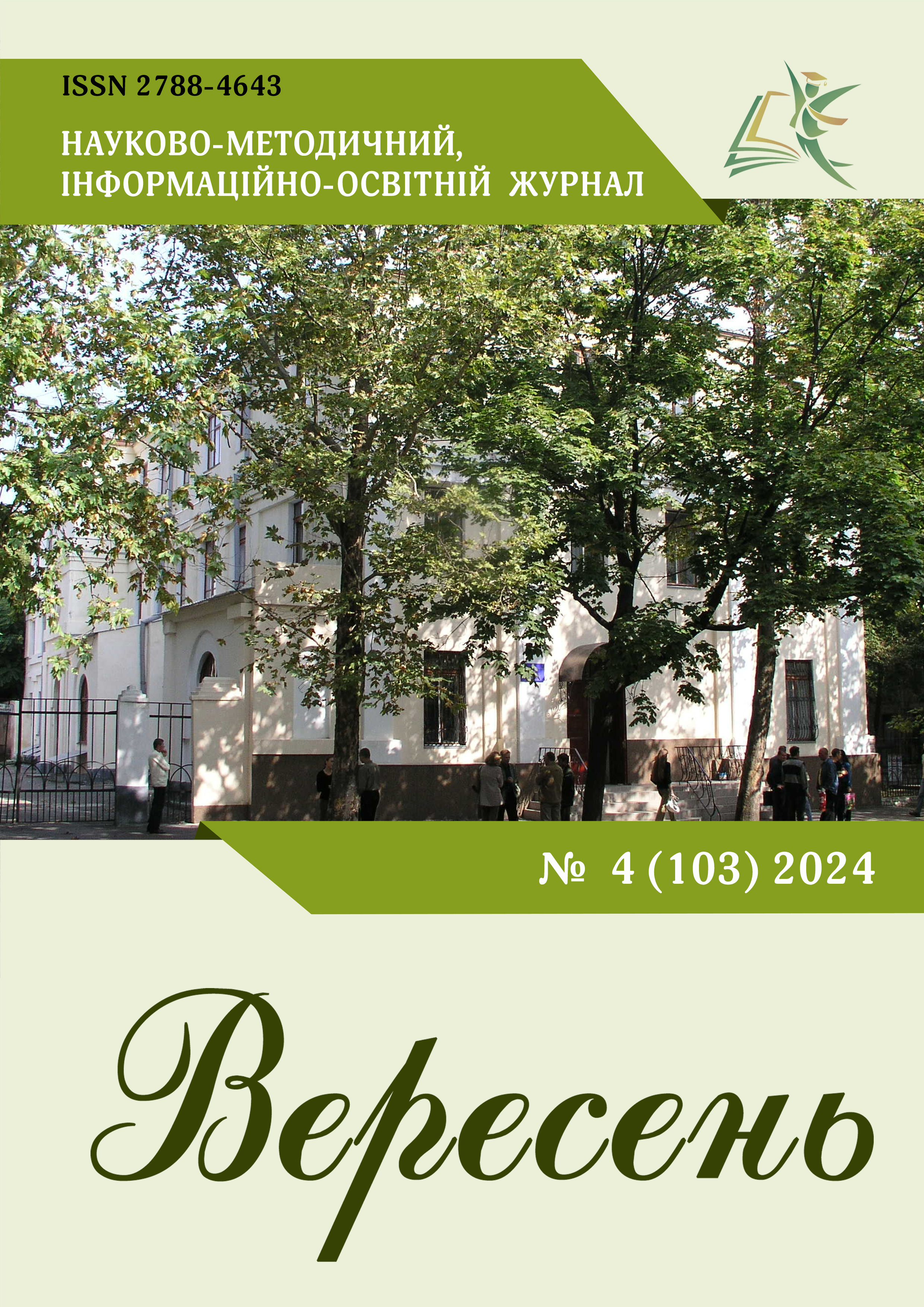FOSTERING ENVIRONMENTAL AWARENESS IN STUDENTS THROUGH PROJECT-BASED ACTIVITIES
DOI:
https://doi.org/10.54662/veresen.4.2024.06Keywords:
environmental initiative, environmental awareness, «City in a Park» , the Mykolaiv region, project activities, self-sown tree saplingsAbstract
The methodological article discusses the initial results of implementing the environmental initiative «City in a Park» by general secondary education institutions in the Mykolaiv region. This initiative was launched by the Mykolaiv Regional Public Organization «Union of Economists», the magazine Economist, and organized by faculty members from the Department of Theory and Methods of Natural Sciences and Information Technologies at Mykolaiv In-Service Teachers Training Institute. The focus is on practical aspects of developing environmental awareness among students through their involvement in project activities and events aimed at environmental conservation. Special attention is paid to fostering a sense of environmental responsibility and awareness of ecological issues. Through participation in such projects, students gain opportunities to deepen their knowledge of local flora and fauna, understanding the interconnections within ecosystems between living and non-living components, while also learning to apply ecological knowledge practically. These projects also help students develop teamwork and leadership skills. Implementing the project-based approach fosters an active stance toward environmental protection and motivates students to engage in sustainable practices and care for natural resources in the future. The biological characteristics of wild plants suitable for greening educational institutions’ courtyards and park areas are considered, along with the process of cultivating these plants within the Mykolaiv region. The local green zones of Mykolaiv have unique features influenced by the region’s climate, geographical location, and ecological specifics. This southern Ukrainian region is characterized by an arid climate and a lack of natural forests, making green areas particularly valuable for maintaining ecological balance and providing recreation spaces for residents. Based on the initial positive results of implementing the «City in a Park» environmental initiative, a list of economically viable plant species for cultivation under the conditions of the Mykolaiv region is proposed. The article analyzes the educational initiative’s outcomes and its significance in nurturing a responsible youth capable of ecological thinking and action, while also outlining perspectives for further implementation of the «City in a Park» environmental initiative.
References
Andrushchenko, V. P. (2004). Ekolohichna polityka i osvita: problemy stanovlennia [Ecological politics and education: becoming problems] In Rozdumy pro osvitu: «Statti, narysy, interviu». K.: Zakon Ukrainy, 253–258 (ukr).
Kardash, D. (2018). Ekolohichna svidomist yak umova stanovlennia ekolohichnoho suspilstva [Ecological consciousness as condition of becoming of ecological society]. Mahisterskyi naukovyi visnyk. Ternopilskyi natsionalnyi pedahohichnyi universytet imeni Volodymyra Hnatiuka. Vypusk 28 (ukr).
Kontseptsiia «Nova ukrainska shkola». Rishennia kolehii MON Ukrainy vid 27.10.2016 [Conception is "New Ukrainian school". Decision of college MON Ukraine from 27.10.2016]. Retrieved from: https://osvita.ua. (ukr).
Miroshnychenko, O. V. & Shyrko, Yu. V. (2012). Vzaiemodiia ekoloho-ekonomichnykh skladovykh systemy natsionalnoi bezpeky Ukrainy [Interaction of ecological and economic components of the national security system of Ukraine.]. In Materialy III naukovykh chytan pamiati Serhiia Tarashchuka. Myhiia: NPP «Buzkyi Hard» (ukr).
Myronenko, I. V. (2023). Uprovadzhennia metodu proiektiv yak zasobu realizatsii diialnisnoho pidkhodu v osvitnomu protsesi z biolohii [Implementation of the project method as a means of implementing an activity approach in the educational process in biology]. Veresen: MOIPPO, 1 (96), 48–59. DOI: https://doi.org/10.54662/veresen.3.2023.04 (ukr).
Nazarenko, L. A. (2015). Formuvannia predmetnoi literaturnoi kompetentnosti starshoklasnykiv zasobamy informatsiino-komunikatsiinykh tekhnolohii [Formation of subject literary competence of high school students by means of information and communication technologies]. ( ). M-vo osvity i nauky Ukrainy, Mykolaiv. nats. un-t im. V. O. Sukhomlynskoho. Mykolaiv (ukr).
Nazarenko, L. A. (2023). Proiektuvannia yak zasib navchannia literatury z vykorystanniam informatsiino-komunikatsiinykh tekhnolohii (starsha shkola) [Design as a means of teaching literature using information and communication technologies (high school)]. Veresen: MOIPPO, 1 (96),128–137. DOI: https://doi.org/10.54662/veresen.1.2023.10 (ukr).
Shedlovska, M. V. (2011). Oznachennia ta typy ekolohichnoi svidomosti [Definitions and types of ecological consciousness]. Ukrainskyi sotsium, 2, 95–100 (ukr).
Shumilova, A. V. (2015). Formuvannia ekolohichnoi svidomosti shkolyariv ekoloho-osvitnimy zakhodamy NPP «Slobozhanskyi» [Formation of ecological consciousness of students through ecological-educational activities at the NNP «Slobozhanskyi»]. Ecological Education: Bulletin of V. N. Karazin Kharkiv National University, Series «Ecology», (13), 104–111. Kharkiv: V. N. Karazin Kharkiv National University (ukr).
Stepaniuk, N. A. (2014). Osoblyvosti formuvannia ekolohichnoi kultury osobystosti [Peculiarities of forming an ecological culture of a person]. Nova pedahohichna dumka, 3, 222–224. (ukr).




